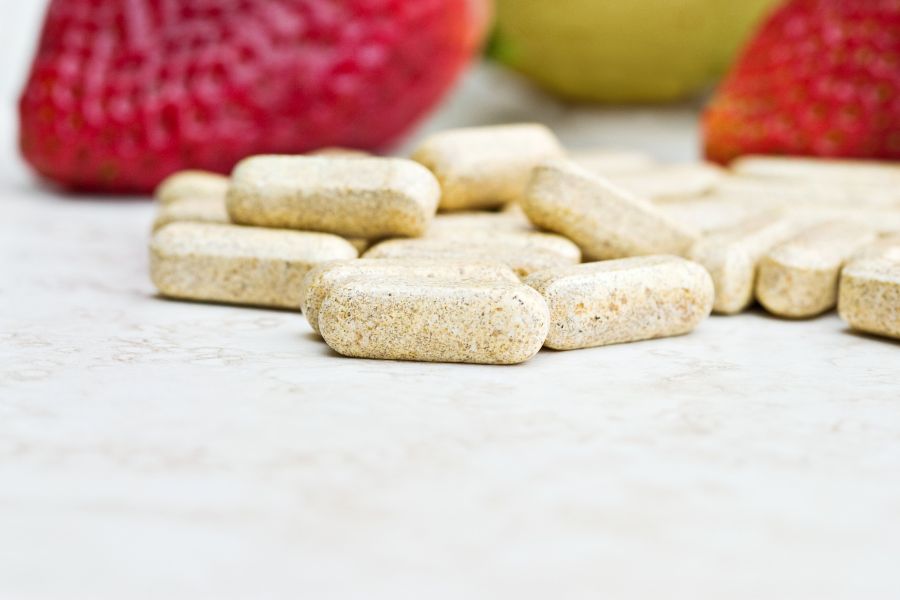As you hold that bottle of prenatal vitamins, a cascade of questions might flood your thoughts. One particular query might stand out: how long can you take prenatal vitamins? Well, dear reader, buckle up! We’re about to dive into what prenatal vitamins entail and the healthy timeframe of usage.
A prenatal vitamin isn’t just a supplement. Within each small pill lies teeming nutrients, ensuring both mom and baby remain healthy. But when should these pills become a part of your life, and should you stop taking them? Find out below.
We also discussed tokophobia in this all-inclusive article. Look it up to explore more on this topic.
Composition of Prenatal Vitamins
When you start taking prenatal vitamins, you’re doing yourself a great deal of good. Every component of that prenatal vitamin plays a specific role in boosting a smooth prenatal experience for expecting mothers.
Folic Acid
At the forefront is folic acid. This key nutrient is paramount in the early stages of baby-building, particularly in preventing neural tube defects. It’s like the lead violinist setting the tone for the entire orchestra.
Iron & Calcium
Vital for mom’s health and baby’s growth, these two ensure oxygen flows beautifully (thanks, iron!) and bones form robustly (take a bow, calcium!).
Vitamin D & DHA
Aiding brain development and bone strength are on point, vitamin D & DHA perfectly harmonize to make sure the show goes on seamlessly.
Yet, these are just the famous prenatal vitamins. An entire ensemble of key nutrients enhances every step of your pregnancy journey.
However, a question remains, and it’s one we’ve all pondered: how long can you continue taking prenatal vitamins?
What are the Benefits of Prenatal Vitamins
Imagine a garden teeming with vibrant flowers, radiant under the sun. Now, think of prenatal vitamins as the sunshine, water, and nourishing soil – all essentials that foster growth.
You might think a healthy diet alone can do the trick, but prenatal vitamins elevate that foundation, enhancing every bloom with a unique vibrancy.
More Folic Acid, Please!
At the heart of these vitamins lies the essential folic acid. While a normal multivitamin or daily vitamins might contain folic acid, prenatal supplements usually offer a higher dose.
Why, you ask? Folic acid plays a pivotal role in developing your baby’s neural tube, eventually forming the brain and spinal cord.
This early child development, crucial in the initial weeks of pregnancy, reduces the chances of birth defects like neural tube defects in kids.
Shine On with Vitamin D
Sunlight is our primary source of vitamin D. But let’s face it, not all of us bask under the sun regularly. Prenatal vitamins come to the rescue by giving pregnant women enough sunshine vitamin, which supports bone health for both mom and baby.
A Symphony of Vitamins and Minerals
Prenatal supplements are like a meticulously curated playlist. They contain all the vitamins and minerals tailored specifically for the unique needs of soon-to-be moms. From aiding blood circulation to making sure the baby’s tiny heart pumps just right, these nutrients have got it all covered!
Should You Use Previtamins Before Pregnancy?
Even before the curtain rises on pregnancy, filling your body with essential vitamins primes you for the upcoming act. Experts suggest that you start taking prenatal vitamins about 3 months before you start trying to get pregnant. It’s a surefire way to ensure your baby gets all the necessary nutrients when you eventually get pregnant. The spotlight often shines brightest on folic acid, but other prenatal vitamins, rich in B vitamins and minerals, play equally compelling supporting roles.
While relying solely on a balanced diet is tempting, dietary supplements are an insurance policy. They ensure you lack no nutrients. From the B vitamin that fosters healthy red blood cells to the iron that fuels vitality.
Duration of Consumption During Pregnancy
Pregnancy is the crescendo in this melodious journey, a time when every note and every beat counts. Several pregnancy activities, like sleeping on your back or not, affect your baby’s growth. One of them includes taking vitamins. This is where the story of prenatal vitamins takes center stage.
A Daily Dose of Dedication
With the baby’s growth and the body’s transformation, the importance of prenatal vitamins surges. They’re not just dietary supplements now; they’re lifelines. They deliver all the necessary nutrients to the baby, even if the mom’s diet misses a beat.
Navigating the Acts
Each trimester poses unique challenges and demands. While the initial weeks prioritize neural development, the later stages focus on bone strength, brain growth, and birth preparation. Prenatal vitamins are important during this phase to harmonize these processes. From developing robust skeletal structures to fostering healthy neural pathways.
Postnatal Vitamins
As the grand act of pregnancy concludes, many wonder, “Should I stop taking prenatal vitamins?” The narrative doesn’t end with birth. But that’s where the postnatal vitamins take center stage. Similar to their prenatal counterparts, these drugs are suitable for the post-birth period, supporting both the recuperating mother and the breastfeeding baby.
So, Should You Continue It After Pregnancy
As the curtains close on the grand act of pregnancy, one might wonder if it’s time for the prenatal vitamins to take their final bow. However, like an encore in a mesmerizing concert, the role of these vitamins often extends beyond the pivotal event.
Just because your baby has arrived doesn’t mean the need for enough folic acid wanes. Especially for nursing mothers, folic acid remains crucial for the baby’s brain development. While your little one draws nutrients directly from you, ensuring a consistent supply benefits both.
After the marathon of childbirth, many women experience a dip in their iron levels. Taking a prenatal vitamin with iron supplementation can replenish these levels, aiding in faster postpartum recovery.
Pregnancy is a demanding act that can take a toll on your bone health. The calcium and vitamin D in prenatal vitamins are essential to restore and maintain your skeletal strength.
Beyond Postpartum – Should You Continue Taking Prenatal Vitamins?

As weeks turn into months, and the memories of the entire pregnancy journey start forming a beautiful mosaic, you might be tempted to put away the bottle of prenatal vitamins. But should you?
Feeding the Brain
Even after childbirth, if you’re nursing, your baby’s brain development continues rapidly. Extra folic acid and other nutrients in the prenatal vitamins support this growth. It makes sure your baby’s brain receives the best nutritional backing.
Back to Basics
While the intensive support from prenatal vitamins is invaluable, your body’s needs shift as you move further from the postpartum period. If you’re no longer breastfeeding or feel robustly replenished, transitioning to a standard multivitamin that caters to your current stage of life might be a good step. However, always consult with a healthcare professional before making any changes.
Prepping for Round Two
If you’re considering expanding your family again soon, you can maintain a regimen with prenatal vitamins. That way, you’re consistently fueled with all the right nutrients, setting the stage for another wonderful journey.
Bottom Line
Are you embarking on the journey of motherhood? It’s pivotal to start prenatal vitamins early on. These nutritional powerhouses, rich in fatty acids and other essentials, are critical to a harmonious pregnancy journey.
However, like any supplement, being aware of the potential side effects is crucial. So, always consult a healthcare professional.




